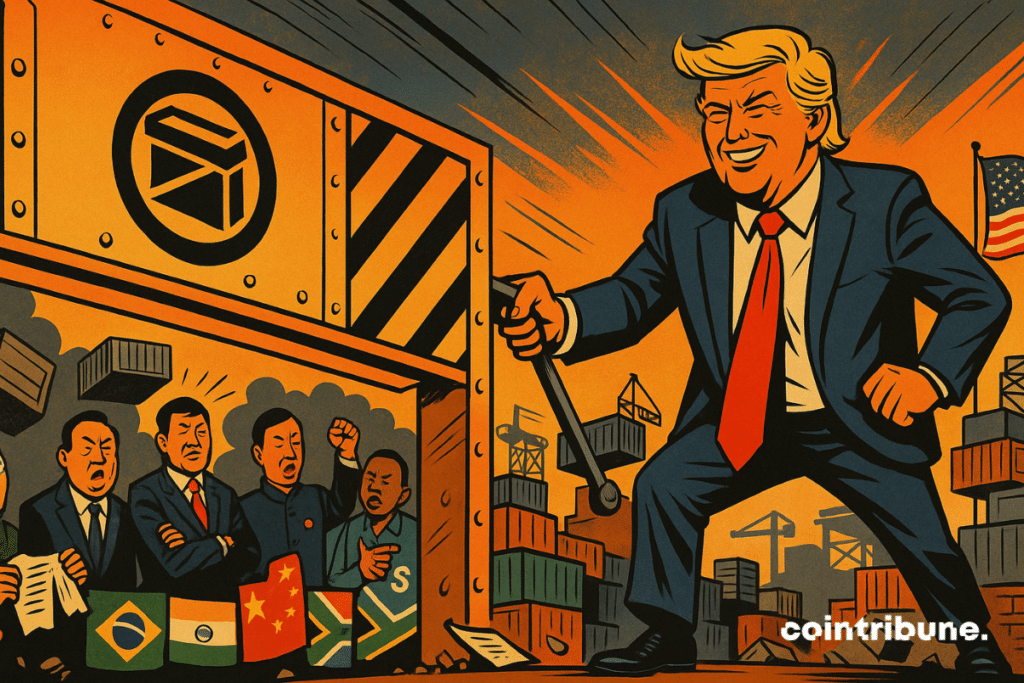BRICS Blasts U.S. Protectionism: Rio Declaration Signals Global Finance Shift
BRICS nations drop the diplomatic gloves—calling out U.S. trade barriers in a historic Rio Declaration that could reshape global economics.
Why it matters: The bloc’s unified stance against protectionism signals a potential power shift away from dollar dominance—just as crypto was already doing the heavy lifting.
The subtext: While politicians posture, decentralized finance keeps quietly bypassing borders. Wall Street’s compliance departments must be sweating into their latte art.

In Brief
- The 2025 BRICS summit opens in Rio amid high tension, marked by strong trade concerns.
- The BRICS denounce unilateral customs measures which, according to them, distort the rules of global trade.
- A joint declaration calls for strengthened South-South cooperation and a fight against disguised protectionism.
- Donald Trump responds sharply with a threat of a 10% surtax for all countries aligned with the BRICS.
BRICS on the Defensive Against Unilateral Measures
The Rio summit, which could turn into disillusionment for the bloc, opened under tight surveillance, in an atmosphere heavy with diplomatic tension. Gathered in Brazil for two days, the BRICS leaders issued at the opening a joint declaration expressing their “serious concerns” about the rise of tariffs imposed unilaterally.
Without ever naming the United States, the signatories denounce “the increase of unilateral tariff and non-tariff measures that distort trade”. According to them, these practices harm the “prospects for global economic development”. The BRICS, representing nearly 40 % of world GDP and half the planet’s population, intend to present a united front despite sometimes divergent interests.
In this declaration, the bloc members also affirm their commitment to a fairer economic order. Notably, it includes :
- The explicit condemnation of all forms of disguised protectionism, including non-tariff barriers ;
- A call for strengthened South-South cooperation to reduce dependence on Western economies ;
- A warning about systemic risks caused by unilateral economic measures, which “distort the rules of global trade” according to the official statement.
However, this common stance masks a more complex reality. The Rio summit is marked by the notable absence of Chinese President Xi Jinping, who for the first time since taking power in 2012, is not attending.
On his side, Vladimir Putin speaks only via videoconference due to the International Criminal Court’s arrest warrant. Brazilian President Luiz Inácio Lula da Silva, host of the summit, opened the discussions with a worrying observation: “we are witnessing an unprecedented collapse of multilateralism”. In the summit corridors, the difficulty in producing a unified line on sensitive subjects, such as the Gaza conflict or relations with Iran, illustrates the group’s growing heterogeneity.
Trump Rekindles the Tariff War : A Deliberate Economic Strategy
The American reaction was swift. A few hours after the BRICS statement was published, Donald Trump declared via his social network: “any country aligning with the BRICS’ anti-American policies will face an ADDITIONAL tariff of 10 %. There will be no exceptions to this policy.”
Shortly after, he published a copy of an official letter sent to South Africa announcing a 30 % customs surtax effective from August. According to U.S. Treasury Secretary Scott Bessent, surtaxes of up to 50 % will come into effect on August 1, 2025, if no agreement is reached with trade partners by then.
In response to this escalation, the emerging global powers have remained measured. China, through its spokesperson Mao Ning, emphasized that “trade and tariff wars have no winners”, calling for “win-win cooperation”. The Kremlin, for its part, recalled that “interaction within the BRICS has never been and will never be directed against third countries.”
If the American announcements materialize, they could trigger a major strategic realignment in international trade. For the BRICS, these tensions reinforce the need to accelerate cross-border payment projects in local or digital currencies. Some analysts are already talking about a possible revival of the BRICS common currency project, or at least increased interoperability between their respective CBDCs.
In the wake of these developments, blockchain infrastructures could play an increasingly central role in facilitating bilateral trade outside the SWIFT system, notably through DeFi protocols or stablecoins not pegged to the dollar. If this tariff war is confirmed, it could well mark a decisive step in the dedollarization of the world economy and position cryptocurrencies as new instruments of international economic arbitration.
Maximize your Cointribune experience with our "Read to Earn" program! For every article you read, earn points and access exclusive rewards. Sign up now and start earning benefits.

